Biotechnology has always fascinated me for being able to modify the crops for a sustainable agricultural production using foreign genes. After finishing my major in Molecular Biology and Biotechnology (2013) from University of Peradeniya, Sri Lanka, I started applying for PhD positions in Australia to follow my dream to pursue higher studies in plant science. I was privileged to start my PhD in 2015 in the faculty of Veterinary and Agricultural sciences, The University of Melbourne under the guidance of Professor Dr. Paul Taylor and Associate Professor Dr. Derek Russell on canola biotechnology.
Canola, being the second most important oilseed crop in the world and Australia being an important producer, my study focusses on the use of new genes to alleviate abiotic and biotic stresses in canola. I started developing and optimising the tissue culture based gene transformation of canola using rapid-cycling Brassica napus as the model system and used the developed techniques to introduce traits of interests for farmers such as tolerance to frost and diseases.
In 2017, I joined the Australian society for plant scientists (ASPS), a useful society in Australia which helps young scientists to connect, publish and choose career pathways. I was fortunate to win a travel award from ASPS to attend ComBio 2017 held in the convention centre, Adelaide to present some of my research findings. It was a good opportunity to hear from other researchers around the world and to get to know researchers with similar research interests.
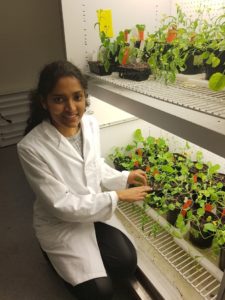
Aruni Alahakoon, Faculty of Veterinary and Agricultural Sciences, University of Melbourne
All plants are subject to diseases caused by different pathogens which can affect food security. Among all these plant pathogens, rust fungi are specialized to different economically important crops such as wheat and barley and can cause substantial crop failure. Due to the increase in human population and emergence of new virulent races of rust pathogen, the identification of new durable sources of resistance is crucial for future crop protection and food security. Therefore, my PhD project involves determination of the genetic and molecular basis of resistance in barley in response to cereal rust pathogens (Puccinia rust pathogens). My work includes resistance gene identification in response to diverse rust pathogens in selected mapping barley populations, subsequent fine mapping analysis with an ultimate aim to discover novel resistance sources in barley that are effective to rust pathogens and can be transferred into other crops.
The ASPS travel grant fund enabled me to attend the COMBIO conference 2017 in Adelaide which was a critical juncture for my professional development. This conference was a great opportunity to present my research to a wide range of experts and research groups in plant science. I had the opportunity to present a major component of my PhD project, which enabled me to improve my oral presentation skills, receive feedback and develop network with scholars within the Australian plant scientific community. The improved results based on the presented work has been published in Phytopathology Journal in May 2018.
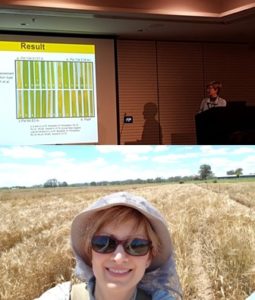
Rouja Haghdoust, PhD student, Plant Breeding Institute, The University of Sydney
My name is Yoav Yichie and I’m a PhD candidate from The University of Sydney. I am in the third year of my candidature, and I’m focusing on the vast genetic diversity of endemic Australian rice species, particularly O. australiensis and O. meridionalis. In my research I deal with one of the most critical issues related to climate change and land management: soil salinity. Salinity affects a significant proportion of arable land globally, and is particularly detrimental for irrigated agriculture, which provides approximately one-third of the world’s food supply. Millions of hectares are technically suited for rice production but are left uncultivated, or give very low yields, because of soil salinity.
There is now a burgeoning interest in native rice species as a source of abiotic stress tolerance genes; however, to date, no work has been published on their salt tolerance.
In my research I use the genetic pool stored in wild relatives of crop species to enrich the genetic diversity and provide improved traits to commercial rice varieties.
Last year I presented some of my research findings at COMBIO 2017, Adelaide. I had the opportunity to discuss my research with some of the most well-known researchers in this field. I met many colleagues and expanded my scientific network. I am grateful to have had the opportunity to share my knowledge and obtain feedback and insights from other researchers from around the globe. I was awarded for the Best Phenotyping Poster by the APPF Plant Phenomics. I wish to gratefully acknowledge the APPF committee who awarded me the poster prize.
I was granted financial assistance to attend and present this poster at ComBio 2017. In this poster, I highlighted the main results of the salt screening experiments, where I managed to establish a core collection of salt-sensitive and tolerant accessions.
Participating in ComBio 2017 was a great experience for me. Firstly, I would like to thank the committee for providing a grant travel that gave me that opportunity. As part of the three-day conference, I attended meetings related to plant development, physiology, technology and abiotic stress. The talks (and the great speakers) enabled me to enrich my knowledge and broaden my understanding of these fields. Moreover, by presenting my poster entitled “High-throughput non-invasive phenotyping reveals salinity tolerance in Australian wild rice species during seedling growth”, I had the chance to obtain feedback and consult with researchers from many disciplines. This experience provided a platform for some useful discussions which will help to strengthen parts of my thesis as well as highlight areas needing further work.
I thoroughly enjoyed the conference and think it was a great opportunity for me at this early stage in my career as a researcher. Networking with scientists from diverse backgrounds and interest has reignited my passion and enthusiasm for science and particularly plant genetics research. I would like to thank The Australian Society of Plant Scientists for awarding me the grant which made my attendance possible.
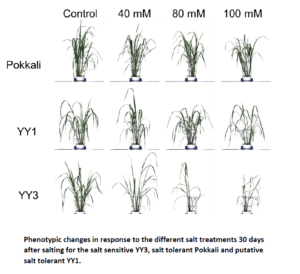
Yoav Yichie, PhD Candidate, Faculty of Agriculture and Environment, School of Life and Environmental Sciences, The University of Sydney
I am Chana Borjigin, a 3rd year PhD student from the University of Adelaide. I grew up on a small farm where I always had a close relationship with different cereal crops like maize, rice, wheat and beans. Following my father to inspect the crops on the farm after school brought so much fun to my childhood life. I started my bachelor’s studies in plant sciences (in the specialization of agriculture sciences) in 2006, and never thought to work or study in any other field in the past 12 years as plants to me is like my beloved pets and I like being with them.
My PhD research is on understanding sodium tissue tolerance in a bread wheat landrace Mocho de Espiga Branca. My poster entitled Identification of Novel Loci and Genes for Salinity Tissue Tolerance in a Bread Wheat Landrace Mocho de Espiga Branca was awarded the ASPS Student Poster Prize at the ComBio 2017 held in Adelaide. I am thankful for ASPS Committee for awarding me the prize. It is the first prize I have ever been awarded in my PhD life and is definitely going to be a great encouragement on continuing my research in plant sciences. Participating and presenting at the ComBio 2017 offered me with a great opportunity to present my research work in front of experts and peers in plant sciences to get constructive comments and exchange ideas. By attending the conference, I was also able to build up potential collaborating networks for my current research, and with a couple of scientists we already have started our collaboration on a part of my PhD project.
I am grateful for being a member of ASPS and looking forward to meeting with all other members again and update my recent research progress at the ComBio 2018 in Sydney!
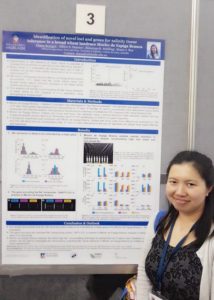
Chana Borjigin, PhD Candidate, School of Agriculture, Food and Wine, University of Adelaide
As recipient of the ASPS travelling fellowship I was given the opportunity to travel to Heidelberg, Germany, famous for its numerous scientific institutes as well as the beautiful scenery. My PhD project in the Gendall lab at La Trobe University involved studying the importance of a class of Na+/H+ exchanger proteins or NHXs in the model plant species Arabidopsis thaliana. These proteins localise to the membrane of various vesicles in the cell which are responsible for the sorting and recycling of cellular cargo proteins. My work in Australia studying these vesicles involved light microscopy studies which are not capable of resolving the structure of these vesicles I am interested in.
Through the generous funding of the ASPS I was able to visit the lab of Prof. Karin Schumacher who is one of the leaders in the plant cell biology field, and whose lab has great experience in using electron microscopy to resolve the ultrastructure of these membrane bound vesicles. After learning how to prepare my plant root samples for imaging under the electron microscopy with guidance from Dr. Stefan Hillmer, we were able to obtain strikingly clear images of a type of cellular vesicle called multi-vesicular bodies (see Figure). I am currently analysing these results to determine if the formation or maturation of these vesicles could be disrupted in plant cells which lack particular NHX proteins. I am grateful to the ASPS for providing me the opportunity to learn valuable skills and techniques overseas which I would not be able to achieve in Australia.
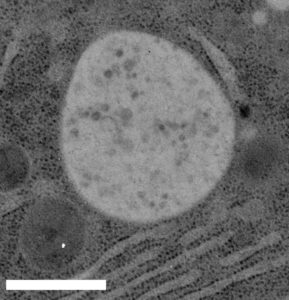
Transmission electron microscopy image of an enlarged multi-vesicular body (white structure) in an Arabidopsis thaliana root cell. The numerous dark structures contained in the multi-vesicular body are intra-luminal vesicles which contain cargo proteins destined to be degraded. Scale bar = 500nm.
Jonathan Dragwidge, PhD candidate, La Trobe University
